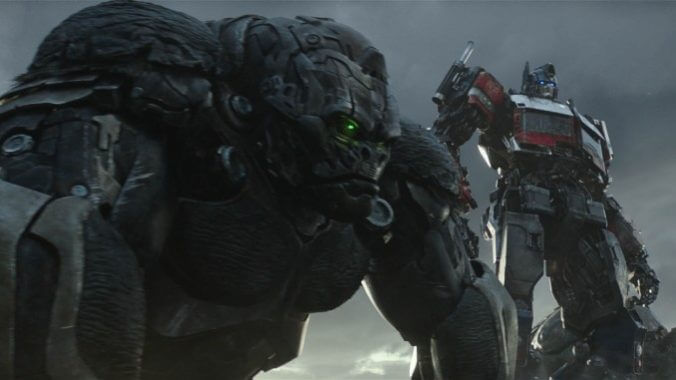Transformers: Rise of the Beasts Is Bad, but It’s Not Michael Bay Bad

Transformers: Rise of the Beasts is among the best live-action Transformers movies, though that may come as faint praise if you sat through any of Michael Bay’s directorial extravaganzas. While the requirements of robot fights and threats to global security don’t leave ample room for deep characters, the film maintains an emotional core and believable motivations. Rise of the Beasts is shorter, faster and generally more economical than most previous Transformers, but has begun leaning bigger and badder after the more compact Bumblebee. Steven Caple Jr.’s third feature film is thematically and aesthetically on a spectrum between the Bay films and Travis Knight’s picture, struggling for a soul of its own as one more studio uses reboots and sequels to create another exhausting crossover franchise.
A Transformers movie has a now-familiar template: A misunderstood young person (ex-Army tech wiz Noah, played by Anthony Ramos) going through hard times (low income, brother needs constant medical treatment) discovers a car that is actually an alien robot in disguise (Pete Davidson, as Mirage of the Autobots) hiding on Earth from evil robot aliens (led by Peter Dinklage, as Scourge of the Terrorcons). The protagonists must find an object (the Trans-Warp Key, which allows intergalactic travel) and keep it out of the enemies’ hands for as long as possible, and then fight once the enemies seize the object and bring about catastrophe. On the way they learn about the power of friendship and how cool transforming robot cars are.
Ramos and Dominique Fishback (playing museum intern Elena) play well off each other, while Peter Cullen is reliably excellent as the surprisingly blunt and brutal Optimus Prime. Among the new Maximals, Michelle Yeoh (the giant falcon Airazor) and Ron Perlman (robo-gorilla Optimus Primal) believably embody the characters, while Dinklage and Colman Domingo (his boss, Unicron) are appropriately yet not memorably menacing. The rest of the robots have little characterization, but there sure are a lot of them.
There are countless similarities between the story of Transformers: Rise of the Beasts and its genre and franchise predecessors—from Star Wars to Galactus, from Man of Steel’s World Engine to Justice League’s The Unity. The final fight scene is as gray as Endgame’s ultimate battle. A smaller cast means the individual characters can shine slightly more with their moments of spectacle and triumph, but less familiarity with the characters limits the appeal. However, this franchise deserves commendation for its persistent commitment to visceral robo-gore.
Part of the formula for Transformers movies is having enough flesh-and-blood humanity to give us something to hold onto as unreality encompasses them, while simultaneously fulfilling our craving for robots fighting and cracking wise. If the past of the franchise or the recent history of the four-quadrant blockbuster are any indication, escalation will always skew toward bigger threats rather than more intimately intense emotional stakes. The way to maintain humanity with the fate of the world in balance is to establish characters and tie us to their concerns clearly and firmly. Rise of the Beasts does that; it perhaps slightly overdoes it, and overestimates the success of its protagonist, but it is still on the right side of the ratio.
-

-

-

-

-

-

-

-

-

-

-

-

-

-

-

-

-

-

-

-

-

-

-

-

-

-

-

-

-

-

-

-

-

-

-

-

-

-

-

-








































